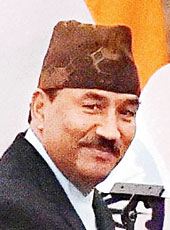New Delhi, March 11: Landlocked Nepal wants to ink unprecedented trade and transit pacts with China to access the seas through its northern neighbour, the country's deputy Prime Minister said today, but added that the plans are not aimed against New Delhi, Kathmandu's biggest trading partner.

The pacts that will end India's status as Nepal's sole route to maritime trade will top the agenda when the country's Prime Minister, K.P. Sharma Oli, visits China next week, deputy Prime Minister Kamal Thapa told The Telegraph in an exclusive interview today.
"As a landlocked country, Nepal has to try and access the oceans through both its neighbours - that's why this will be discussed in Beijing," Thapa said. "But there is no need to doubt our intentions. India needs to get out of the mentality that Nepal is playing a card against it."
The comments by Thapa, who is visiting India to attend the World Culture Festival organised by the Art of Living Foundation of spiritual guru Sri Sri Ravi Shankar, come at a time India and Nepal are trying to overcome months of tension unseen in two decades.
Oli visited New Delhi in February on his first foreign visit since taking over late last year, inking a series of agreements including the rights to use Visakhapatnam port for maritime trade.
Thapa, also the foreign minister of Nepal, will host foreign minister Sushma Swaraj and counterparts from other nations of the South Asian Association for Regional Cooperation (Saarc) in the valley city of Pokhara.
"Our relations with India are unique, unparalleled with any other country," Thapa said. "And there is tremendous potential in our relationship."
His attempts to delink Nepal's growing relations with China from Kathmandu's ties with New Delhi also coincide with the increasing flexibility the Nepalese government is showing in addressing concerns by the Madhesi community.
Those concerns, over a new constitution Nepal adopted last September, had triggered a five-month-long blockade along the India-Nepal border which Kathmandu blamed on New Delhi.
India insisted that the Madhesi community was responsible for the blockade - but the differences spiralled into a rare exchange at the UN and a humanitarian crisis in Nepal.
Amendments to the constitution accepted by Nepal's parliament last month have addressed two of the major concerns of Madhesi protesters - but a third, on the demarcation of provincial boundaries, remains.
The Nepal government has now set up a panel of top political leaders, chaired by Thapa, to draw up recommendations on meeting the third Madhesi demand.
"This is a very serious, sensitive issue that will take time," Thapa said. "But we understand that Madhesi leaders still have reservations about the terms of reference of our panel and we are willing to be flexible - as long as they too are willing to recognise that just by going on protest, they can't get everything they want."
With the constitution in place, Nepal was now entering a phase where it wants to focus on economic development, and needed India more than ever, Thapa said.
"India has major global economic aspirations, and we feel we can hitch ourselves to those aspirations and gain from India's growth," he said. "Common prosperity should be the guiding principle of our relationship."
But Thapa made it clear that Nepal was also looking to diversify its trade options beyond India - something every country, including India does, but which New Delhi at times worries over when its smaller neighbours and China are involved.
Nepal currently has no broad trade agreement with China - while it does have one with India.
The transit agreement with China would reduce Nepal's trade and strategic dependence on India particularly if New Delhi and Kathmandu were to return to the tensions that marked their ties till recently.
"Nepal cannot afford to have ill-will with India, but we would similarly like to have the best of best relations with China," Thapa said. "For the development and economic growth of Nepal, it is important for us to take advantage of the economic progress of both its neighbours."
But Thapa insisted that Nepal's outreach to China was not aimed at undermining India - iterating Kathmandu's commitment that it will not allow anyone to use its territory to target either of its two neighbours.
The crisis in the bilateral relationship had also underscored the need for the neighbours to not allow tensions over any "one issue" to derail ties, Thapa said.
"India should not look at our outreach to China with suspicion," he said. "The lesson we have learned is that we have to be careful not to allow one issue to become an impediment in our overall relations."
China incursion
Chinese troops entered almost 6km inside Indian territory near Ladakh's Pangong lake this week, leading to a stand-off with their Indian counterparts, security sources told PTI.
The latest transgression took place on March 8 when a platoon of at least 11 PLA soldiers led by a colonel-rank officer crossed over the imaginary Line of Actual Control.
The Chinese soldiers, came in four vehicles. The sources said they were soon "countered and engaged" by a patrol of the Indo-Tibetan Border Police. The sides were locked in "eyeball-to-eyeball" confrontation for a few hours after which the Chinese side retreated.











